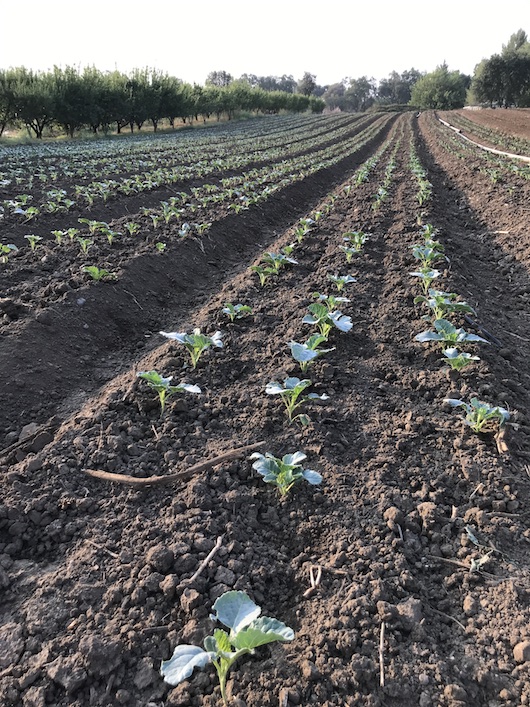
Recently transplanted broccoli for the fall, grown in soil like we’ve always done —
We wear many different hats here at the farm. Each partner tries to embody their ideal and spirit of being activist farmers on top of our day-to-day work. There is an underlying sensibility that comes from the simple act of growing food and making a farm into a living, breathing, productive whole. We have been active in the Organic Food movement for over 40 years as our effort to solve for a pattern of health: in rural communities, in order to eliminate toxic pesticides from farms, in order to make safer workplaces for farmers and farm workers, and in order to supply better, safer food for those consuming what we produce.
In those 40 years of activism, the food system has changed, and Organic Farming has been a powerful instrument of that change, allowing a place for new and entry farmers, eliminating toxins from the farm environment, and becoming a major force in validating the ability of agriculture to be both productive and environmentally healthy. Each partner here feels deeply about their work and how those efforts continue to effect change.
Dru has been a driving force in the Ecological Farming Association, the beneficiary of our upcoming Grateful Harvestdinner; Judith in the Community Alliance with Family Farmers and the Organic Farming Association; Andrew with the Agricultural Institute of Marin and Center for Land-Based Learning; my son Amon is a County Planning Commissioner and volunteer fire captain; his wife Jenna now does mediation for farm succession. My work, when farm things aren’t broken here, has centered on the Yolo Land Trust, establishing a new Capay Valley Land Commons and continuing efforts with the Real Organic Project.
It is clear that we all believe in the potential of Organic Farming systems and living on a productive farm with a different productive and economically viable farm design to validate that belief. In spite of the skepticism from our agricultural colleges, over the past 40 years small farmers throughout the world have shown that organic systems, agroecological approaches to food production, and human hands connected to a place as stewards and crafters of right relationships with land are the most resilient patterns for farming sustainably and feeding the planet. It has been small farmers on the creative edge offering and practicing an alternative, years ahead of our universities, and in sharp contrast to their promotion of capital and energy intensive farming systems that assert genetic modification matched with selective chemicals as the only farming future.
Organic Farming has become wildly successful. Good ideas find their time and resonate far beyond farm fields. The Real Organic Project is being built by farmers who are convinced that the community touched by Organic Farming needs to be active in the defense of its fundamentals and that the relatively small group of those with a vision of a healthy agriculture can once again adjust the course of agriculture.
The USDA has now ruled that soilless, container and hydroponic systems can now be certified as Organic and items grown in this manner can be sold as equivalent to crops harvested from soil-based Organic farms. The USDA has also become lax in their enforcement of animal welfare and the USDA is also modifying the requirements for an Organic Systems Plan to fit the needs of increasingly larger operations who forgo the requirement for fostering farm diversity. As Organic becomes big business, the fundamentals can be forsaken for political expediency and financial influence.
The Real Organic Project has been formed by Organic farmers to counter this diminishment of the work that we have done for the past 40 years. Many farmers are awakening to the notion that soil systems have been viewed through an incredibly simplistic lens. The high tech tools of genetic manipulation and larger machinery that turn farms into factories are simple formulas for treating complex rural ecosystems as uniform. ‘Smart’ people look to export the chemistry of pesticides and genetically modified seed to places where they see sending farmers with historical knowledge of their land to the city as the formula for feeding humanity. These ‘modern’ systems do not solve for a pattern of health, cultural respect, and raising human dignity, and most often concentrate the power of food production in the hands of fewer entities.
This letter has been too long winded as I am hoping to put this request in context: we are hoping that you can help us by financially contributing to our work of signing up farmers to be certified as Real Organic Farms and demanding change with the USDA governance of the National Organic Program. We are making a model of shared commitment with those who are capable of supporting this work and the farms who practice the basic tenets of organic farming: tending healthy soil, harvesting sunlight in pastures that feed animals in clean air and foraging diets that are rich in diversity while fostering biological and ecological diversity as stewards of their farms.
Here is a flipbook describing the work of the Real Organic Project. Please consider coming to a dinner at Oliveto Restaurant and Café. Thanks for your interest in our efforts to protect the integrity and meaning of the word Organic. We look forward to continued community investment in a healthy food system.
All the best,
Paul Muller and Dru Rivers
